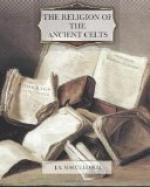[835] L’Anthropologie, xii. 206, 711. Cf. the English tradition of the “Holy Mawle,” said to have been used for the same purpose. Thorns, Anecdotes and Traditions, 84.
[836] Arrian, Cyneg. xxxiii.
[837] Caesar, vi. 17; Orosius, v. 16. 6.
[838] D’Arbois, i. 155.
[839] Curtin, Tales of the Fairies, 72; Folk-Lore, vii. 178-179.
[840] Mitchell, Past in the Present, 275.
[841] Mitchell, op. cit. 271 f.
[842] Cook, Folk-Lore, xvii. 332.
[843] Mitchell, loc. cit. 147. The corruption of “Maelrubha” to “Maree” may have been aided by confusing the name with mo or mhor righ.
[844] Mitchell, loc. cit.; Moore, 92, 145; Rh[^y]s, CFL i. 305; Worth, Hist. of Devonshire, 339; Dalyell, passim.
[845] Livy, xxiii. 24.
[846] Sebillot, ii. 166-167; L’Anthrop. xv. 729.
[847] Carmichael, Carm. Gad. i. 163.
[848] Martin, 28. A scribe called “Sonid,” which might be the equivalent of “Shony,” is mentioned in the Stowe missal (Folk-Lore, 1895).
[849] Campbell, Superstitions, 184 f; Waifs and Strays of Celtic Trad. ii. 455.
[850] Aelian, xvii. 19.
[851] Tacitus, Ann. xiv. 30; Dio Cass. lxii. 6.
[852] Appian, Celtica, 8; Livy, xxi. 28, xxxviii. 17, x. 26.
[853] Livy, v. 38, vii. 23; Polybius, ii. 29. Cf. Watteville, Le cri de guerre chez les differents peuples, Paris, 1889.
[854] Livy, v. 38.
[855] Appian, vi. 53; Muret et Chabouillet, Catalogue des monnaies gauloises, 6033 f., 6941 f.
[856] Diod. v. 31; Justin, xxvi. 2, 4; Cicero, de Div. ii. 36, 76; Tac. Ann. xiv. 30; Strabo, iii. 3. 6.
[857] Dio Cass. lxii. 6.
[858] Reinach, Catal. Sommaire, 31; Pseudo-Plutarch, de Fluviis, vi. 4; Mirab. Auscult. 86.
[859] Strabo, iv. 4. 6.
[860] Justin, xxiv, 4; Cicero, de Div. i. 15. 26. (Cf. the two magic crows which announced the coming of Cuchulainn to the other world (D’Arbois, v. 203); Irish Nennius, 145; O’Curry, MC ii. 224; cf. for a Welsh instance, Skene, i. 433.)
[861] Joyce, SH i. 229; O’Curry, MC ii. 224, MS Mat. 284.
[862] IT i. 129; Livy, v. 34; Loth, RC xvi. 314. The Irish for consulting a lot is crann-chur, “the act of casting wood.”
[863] Caesar, vi. 14.
[864] O’Curry, MC ii. 46, 224; Stokes, Three Irish Homilies, 103.
[865] Cormac, 94. Fionn’s divination by chewing his thumb is called Imbas Forosnai (RC xxv. 347).
[866] Antient Laws of Ireland, i. 45.
[867] Hyde, Lit. Hist. of Ireland, 241.




